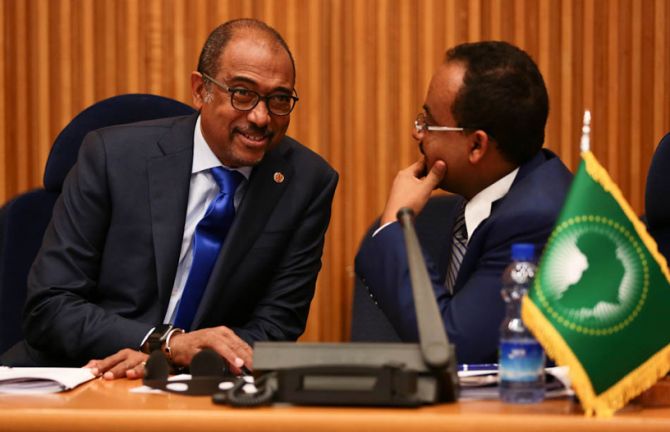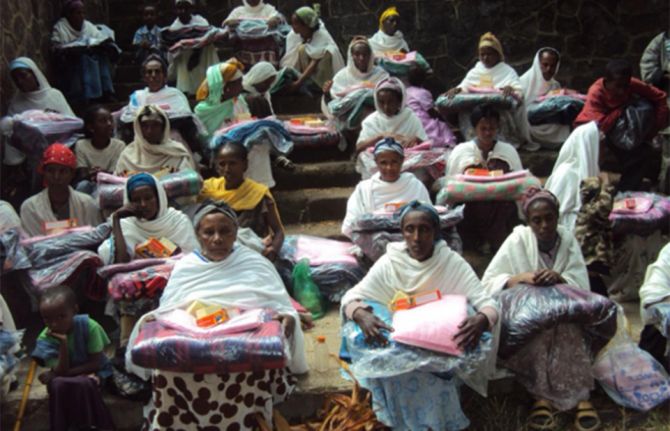





Feature Story
UNAIDS joins forces with the One Million Community Health Workers campaign to achieve the 90–90–90 treatment target
02 February 2016
02 February 2016 02 February 2016UNAIDS and the One Million Community Health Workers (1mCHW) initiative have announced a major strategic partnership to support the achievement of the 90–90–90 treatment target and to lay the foundation for sustainable health and development.
The new partnership emerged at a high-level meeting of eight African health ministers and other stakeholders in Addis Ababa, Ethiopia, held on 1 February, which focused on the 90–90–90 treatment target and human resources for health. The participants of the meeting called for the world to leverage the aim of achieving the 90–90–90 treatment target to strengthen human resources for health.
In his opening address, Marc Angel, UNAIDS champion for the 90-90-90 treatment target, told participants that increased human resources for health would be essential.
“Achieving the 90-90-90 target requires health workers, specific expertise and laboratories equipped with the necessary materials,” said Mr Angel.
Jeffrey Sachs, director of the Earth Institute at New York’s Columbia University and founder of the 1mCHW initiative, emphasized his commitment to the 90–90–90 treatment target. As the United Nations Secretary-General’s Special Adviser on the Sustainable Development Goals (SDGs), Mr Sachs pledged to place 90–90–90 at the centre of advocacy for the SDGs.
“The 90–90–90 effort of UNAIDS is historic: a rigorous, scientific and bold approach to end the AIDS epidemic,” Mr Sachs said. “The end of AIDS is within reach, and community health workers will play a pivotal role in empowering communities to end deaths from AIDS and to break the transmission of the virus. The 1 Million Community Health Worker campaign is honoured to join UNAIDS in its path-breaking programme.”
Cosponsored by UNAIDS, the African Union and Ethiopia’s Ministry of Health, the meeting revealed both strong support for the 90–90–90 treatment target and agreement that it offers a unique opportunity to recruit and mobilize hundreds of thousands of community health workers.
“Ethiopia will spare no efforts to reach the 90–90–90 treatment target,” said Kesetebirhan Admasu, Ethiopia’s Minister of Health. “We are determined to relegate AIDS to the books of history.”
To reach the 90–90–90 treatment target, the number of people accessing antiretroviral therapy will need roughly to double over the next five years. While HIV programmes have pioneered innovative strategies to enhance the efficiency of service delivery, it is clear that reaching the target will require expanding the number of health workers available to deliver HIV services.
However, many African countries, as well as countries in other regions, have an acute shortage of health workers. Although Africa accounts for 25% of the global health burden, the region is home to only 3% of all health workers.
To ease health worker shortages, the meeting focused on the importance of training and employing trained, provisioned, supervised and remunerated community health workers to expand access to HIV services. “We must reinforce the interface between communities and the service provider,” said UNAIDS Executive Director Michel Sidibé. “We need to use communities and civil society organizations to reach people who are difficult to reach.”
The 1mCHW campaign unites more than 150 organizations worldwide in a major global effort to recruit and deploy trained, equipped, supervised and remunerated community health workers, with particular attention to especially underserved rural communities.
Countries such as Ethiopia, Ghana and Malawi have already taken major steps to train and deploy community health workers to deliver community-based health services. Ethiopia, for example, has trained tens of thousands of health extension workers, who have substantially increased access to good-quality health services. Creation of the community health worker programme in Ethiopia has been associated with a 19-year increase in life expectancy over two decades. Ghana is in the process of deploying 20 000 community health workers in a national scale-up effort.
Other countries are moving to emulate these successful national efforts to expand human resources for health. Lesotho, for example, is embarking on a national effort to create a cadre of health extension workers, with mentoring provided by Ethiopia and Malawi.
Much of the discussion during the one-day meeting focused on how the push to achieve the 90–90–90 treatment target can help drive a sustainable expansion of human resources for health. The global effort to achieve the 90–90–90 treatment target will involve the delivery of simplified, decentralized care to millions of healthy people living with HIV. Self-care, including through such innovations as peer-driven adherence clubs and community distribution of antiretroviral therapy, will play a vital role in the delivery of HIV chronic care management.
Community health workers will be essential for providing these simplified, decentralized services. The Fast-Track approach calls for a sharp increase in financing for community service delivery and an increase in the proportion of HIV services that are delivered through community channels from 5% currently to 30%.
The same community-centred models that will be critical for ending the AIDS epidemic as a public health threat also have a potentially key role to play in addressing the other health targets in the SDGs. Community health workers mobilized through the push to achieve the 90–90–90 treatment target can also help in the delivery of other important health services. Similarly, the chronic care models generated by HIV treatment scale-up are applicable to the management of the growing burden of noncommunicable diseases, such as hypertension and diabetes.
Although the road map for action is clear on 90–90–90 and the health workforce, financing remains a potential obstacle, as investments will be needed for training, supervision and compensation for community workers. There was agreement among health ministers and other participants that mobilizing the necessary investments for expanding the health workforce will require both increased domestic outlays and further increases in international assistance. Mr Sachs called for the creation of a fund for strengthening health systems.
“Here in Africa, we must commit our own domestic resources for health,” said Olawale Maiyegun, Director of Social Affairs for the African Union Commission. “We must live up to our commitments in the Abuja Declaration to dedicate at least 15% of our domestic budget to health.”
“Health is not a cost,” Mr Sidibé said. “Health is not expenditure. Health is an investment. If we scale up, we can bring the epidemic to an end. Yet if we don’t come up with the resources we need, AIDS will rebound, and all our investments in the last 30 years will be lost.”
In planning the meeting, the cosponsors worked with the World Health Organization, the African Society for Laboratory Medicine, the International Association of Providers of AIDS Care, the International Federation of Red Cross and Red Crescent Societies, the Office of the United States Global AIDS Coordinator, Columbia University, the Sustainable Development Solutions Network, the One Million Community Health Workers campaign and the Government of Luxembourg.



